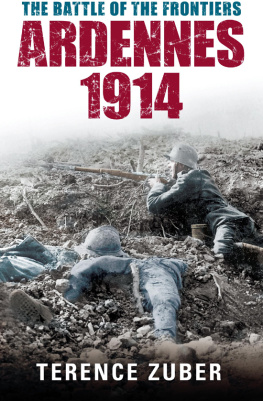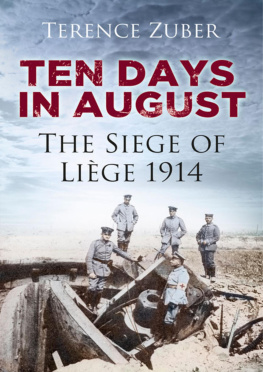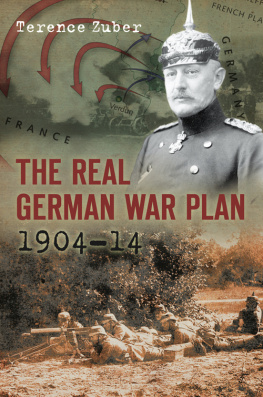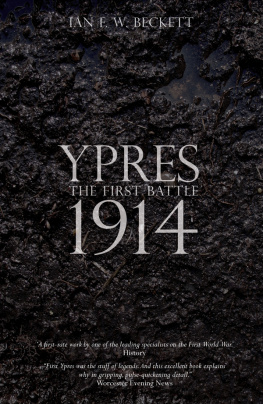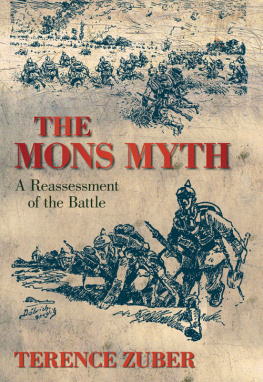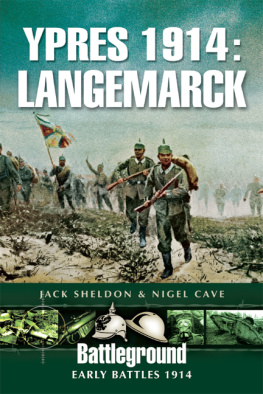Terence Zuber - Ardennes 1914: The Battle of the Frontiers (Battles & Campaigns)
Here you can read online Terence Zuber - Ardennes 1914: The Battle of the Frontiers (Battles & Campaigns) full text of the book (entire story) in english for free. Download pdf and epub, get meaning, cover and reviews about this ebook. year: 2009, publisher: History Press, genre: History. Description of the work, (preface) as well as reviews are available. Best literature library LitArk.com created for fans of good reading and offers a wide selection of genres:
Romance novel
Science fiction
Adventure
Detective
Science
History
Home and family
Prose
Art
Politics
Computer
Non-fiction
Religion
Business
Children
Humor
Choose a favorite category and find really read worthwhile books. Enjoy immersion in the world of imagination, feel the emotions of the characters or learn something new for yourself, make an fascinating discovery.
- Book:Ardennes 1914: The Battle of the Frontiers (Battles & Campaigns)
- Author:
- Publisher:History Press
- Genre:
- Year:2009
- Rating:5 / 5
- Favourites:Add to favourites
- Your mark:
- 100
- 1
- 2
- 3
- 4
- 5
Ardennes 1914: The Battle of the Frontiers (Battles & Campaigns): summary, description and annotation
We offer to read an annotation, description, summary or preface (depends on what the author of the book "Ardennes 1914: The Battle of the Frontiers (Battles & Campaigns)" wrote himself). If you haven't found the necessary information about the book — write in the comments, we will try to find it.
Ardennes 1914: The Battle of the Frontiers (Battles & Campaigns) — read online for free the complete book (whole text) full work
Below is the text of the book, divided by pages. System saving the place of the last page read, allows you to conveniently read the book "Ardennes 1914: The Battle of the Frontiers (Battles & Campaigns)" online for free, without having to search again every time where you left off. Put a bookmark, and you can go to the page where you finished reading at any time.
Font size:
Interval:
Bookmark:
THE BATTLE OF THE FRONTIERS
Battles & Campaigns
A series of illustrated battlefield accounts covering the classical period through to the end of the twentieth century, drawing on the latest research and integrating the experience of combat with intelligence, logistics and strategy.
Series Editor
Hew Strachan, Chichele Professor of the History of War at the University of Oxford
Published
Ross Anderson, The Battle of Tanga 1914
An excellent book Peter Hart, author of Jutland 1916
Ross Anderson, The Forgotten Front: The East African Campaign 1914-1918
Excellent... fills a yawning gap in the historical record Gary Sheffield, Times Literary Supplement
William Buckingham, Arnhem 1944
Startling... reveals the real reason why the daring attack failed The Daily Express
Brian Farrell, The Defence and Fall of Singapore 1940-1942
An original and provocative new history of the battle that marked the end of the British Empire Professor Hew Strachan
David M. Glantz, Before Stalingrad
Another fine addition to Hew Strachans excellent Battles and Campaigns series
BBC History Magazine
Michael K. Jones, Bosworth 1485
Insightful and rich study of the battle no longer need Richard play the villain
Times Literary Supplement
Martin Kitchen, The German Offensives of 1918
Comprehensive and authoritative... first class Professor Holger H. Herwig, War in History
M.K. Lawson, The Battle of Hastings 1066
A BBC History Magazine Book of the Year 2003
Marc Milner, Battle of the Atlantic
The most comprehensive short survey of the U-boat battles Sir John Keegan
A.J. Smithers, The Tangier Campaign
The fullest account of the British Armys first major expedition abroad
Professor Hew Strachan
Tim Travers, Gallipoli 1915
A book of the highest importance... masterly John Lee, The Journal of Military History
Matthew C. Ward, The Battle for Quebec 1759: Britains Conquest of Canada
Terence Zuber, The Battle of the Frontiers: Ardennes 1914
The first history of the opening engagement of the First World War
Professor Hew Strachan
THE BATTLE OF THE FRONTIERS
ARDENNES
1914
TERENCE ZUBER

To old friends, who defended Western Europe during the Cold War.
VII (US) Corps Headquarters
3rd (US) Infantry Division
12th (GE) Panzer Division
1st (US) Infantry Division (Forward)
72nd (US) Field Artillery Brigade
9th (US) Engineer Battalion
Cover illustrations: (front) there are no photographs of combat during the Battle of the Frontiers this picture is from a later period in the war (note the steel helmets); (back, upper) infantry advancing by bounds; (back, lower) infantry advancing in successive waves.
First published 2007
This edition published 2009
The History Press
The Mill, Brimscombe Port
Stroud, Gloucestershire, GL 5 2 QG
www.thehistorypress.co.uk
This ebook edition first published in 2013
All rights reserved
Terence Zuber, 2007, 2009, 2013
The right of Terence Zuber to be identified as the Author of this work has been asserted in accordance with the Copyrights, Designs and Patents Act 1988.
This ebook is copyright material and must not be copied, reproduced, transferred, distributed, leased, licensed or publicly performed or used in any way except as specifically permitted in writing by the publishers, as allowed under the terms and conditions under which it was purchased or as strictly permitted by applicable copyright law. Any unauthorised distribution or use of this text may be a direct infringement of the authors and publishers rights, and those responsible may be liable in law accordingly.
EPUB ISBN 978 0 7524 9672 6
Original typesetting by The History Press
Contents
Introduction
Between 1871 and 1914 the armies of France and Germany prepared with unprecedented intensity and determination for the next war, which was sure to be a bloody affair of national survival. For forty-three years both armies trained, developed new weapons and doctrine, and then trained some more. Spurred by crises in the Balkans and Morocco, from 1905 on Europe was swept by an unprecedented arms race, which reached its apogee in 1913. France and Germany were armed and prepared for war as no other countries had ever been before.
Both Germany and France raised mass armies by means of conscription. Upon completion of national service the conscripts returned to civilian life, but also became reservists, liable for the next 20 years to be recalled to the colours in case of war. When these reservists were mobilised and reintegrated into the army, they would multiply the size of the active army by a factor of three or four, producing field forces of some two million men.
Finally, the long-anticipated day of reckoning arrived. Both countries mobilised on 2 August 1914 and then transported their massive armies to the frontiers. From 20 to 24 August 1914 the French and German armies, each some seventy divisions strong, met head-on in Belgium and Lorraine in the Battle of the Frontiers, one of the most hard-fought, most important and most interesting battles in military history.
One would anticipate that the tactical course of these battles would have been of immense and widespread interest to both military professionals and the general public. In addition, one would also assume that military professionals would have been eager to determine how well peacetime doctrine and training stood up to the test of combat.
In fact, quite the opposite is true. Practically everything has been studied concerning the First World War except the pre-war tactical doctrine and training of the German and French armies. Instead, interest in pre-war armies has centred on non-military topics. The relationship between the military and society before the war is a favourite theme for scholarship, in particular the supposed role of the German army in supporting the political and social status quo. A major military history of France concerns itself with social history to the practical exclusion of ground combat itself.
Tactical combat in the first battles from 20 to 24 August has also been of little interest. There has never been a detailed account of the Battle of the Frontiers in English; the accounts of some of the division-sized engagements written in French and German in the 1920s and 1930s are seldom used today.
On the other hand, books on the German and French war plans and the strategic aspects of the Battle of the Marne are legion, fuelled by military, academic and popular fascination with armchair generalship. The armchair general thinks that the campaign can easily be understood in terms of large black arrows, representing the German armies, slashing across a map of France a half page in size.
The focus on strategy is reinforced by the common perception that tactical combat for both the French and German armies in August 1914 consisted of charging with solid masses of infantry, only to have them mown down by machine gun fire. French critics blamed French defeats in the Battle of the Frontiers on such tactics. British accounts of the initial battles describe combat against German infantry in the same terms as those used for fighting Dervishes or Fuzzi-Wuzzis, with precise and rapid British rifle fire cutting down rows of German troops. In a study of German military thinkers before the First World War, a professor of strategy at the US Army War College concluded that while the high-level military theorists understood the lethality of modern warfare, the troop leaders just didnt get it. He also said that pre-war German training was poor. In the last paragraph, he concludes that young officers, motivated by a reckless spirit of the offensive launched unprepared attacks. This is a completely orthodox conclusion. The War College professor saw no need to describe how the German regulations prescribed that the infantry attack was to be conducted at company and battalion level or how the troops actually trained. Nor did he give any representative examples of how these unprepared, reckless attacks were conducted. He merely restated what was common knowledge.
Next pageFont size:
Interval:
Bookmark:
Similar books «Ardennes 1914: The Battle of the Frontiers (Battles & Campaigns)»
Look at similar books to Ardennes 1914: The Battle of the Frontiers (Battles & Campaigns). We have selected literature similar in name and meaning in the hope of providing readers with more options to find new, interesting, not yet read works.
Discussion, reviews of the book Ardennes 1914: The Battle of the Frontiers (Battles & Campaigns) and just readers' own opinions. Leave your comments, write what you think about the work, its meaning or the main characters. Specify what exactly you liked and what you didn't like, and why you think so.

